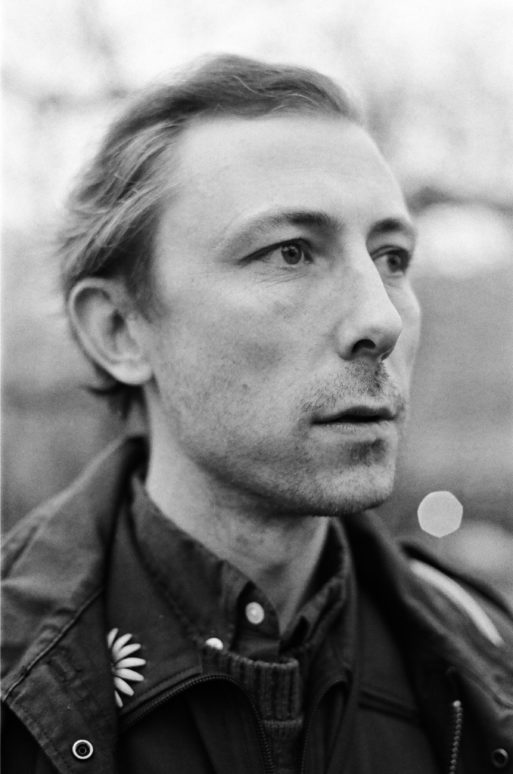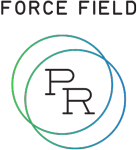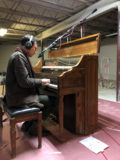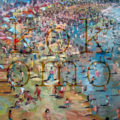
photo credit: Alex Phillipe Cohen
Contact
- Daniel Gill at Force Field PR
[email: daniel@forcefieldpr.com]
Bio
Kokomo, the album adds up to the rejection of Kokomo the concept—that the days of your life and the things you do there are kindling for the cause of the great blaze that awaits you once you have enough vacation days or a record deal. The relationship of Kokomo the album to “Kokomo” the song ends with the mythos the song created. That and the idea for the name was too funny and too fitting to pass up. Kokomo is the Arcadia of the office park, or in the case of my mother when I was growing up, the hospitals and “care facilities” where she worked as a nurse. It was in her car, on the way to Country Convenience to play Megabucks, that my associations with Kokomo began. It’s possibly the only song I remember my mother liking. The memories of the memories of the memories have formed a story in the absence of one. Megabucks is the Great Ship that will one day sail on waters as placid as a windshield for Kokomo, where you won’t have to work two nursing jobs, and you’ll be married to someone who’s at least nice to you, and your kids won’t be total fuck-ups, and Virginia Slims won’t give you emphysema.
In “Clip-On Tie,” a diaristic essay by David Berman chronicling some days in the life of his job as a guard at The Met in the early ’90s, there’s a line, “It would be a tragedy to spend your whole life desperately wanting to be something that you already were, all along.” Working as a museum guard, or a nurse, or a farmhand pulling weeds in a strawberry field, or washing dishes at Johnny Macaroni’s, these situations are where Kokomo exists. The relief and disembodiment “someday” provides. Ultimately the songs on Kokomo contend with and ultimately overcome this “tragedy,” or at least subdue it. Kokomo throughout my twenties and now late thirties has been the refusal of Kokomo. To be an artist, to work as a living rather than for a living, to be somehow radically sincere and yet commercially appealing but with the utmost integrity, singularity, and dignity, like Fugazi or Fran Lebowitz. “Making it” to me meant being active, engaged, part of a community, sustaining a life. But the reality behind this striving was only more waiting: for someone to publish my poems, for someone to put out my records, for someone to write about them so someone would listen to them and I could then be someone who does something useful and meaningful beyond going on vacation. The song Anyone expresses the fatigue and collapse of this impossible need to be told by someone else that you are a person. “They took my world away / but it was my mistake / because the world that I made / could be taken away. // They made glass of it all / and then turned me to stone / now everywhere I go / I make a hole. I don’t want to be anyone anymore” Such is the dream.
It’s an ongoing, active process but I’m here. After all of this personal growth that’s a matter of life or death for the one growing and tedious for everyone else, what’s left is this ten-song album, recorded in Asheville, NC, in the fall of 2018 and touched up in the fall of 2019. It’s a concept album in reverse. As is so often the case with the mysterious oracular powers of writing, the lyrics tell a story that was unknown to the storyteller in the telling. But what I love is that it’s possible that you are who you are even if you don’t know who you are. The gift of perspective shows the fuller picture. For the love of these songs and the people who made them, and for the reasons that anyone does anything, I’m releasing this record. All of this aside, I hope you enjoy and may it find you in good health and heart.
Massachusetts-born, NYC-based musician Jaye Bartell began working in Asheville, NC in the early 2000s as part of the city’s thriving music and writing scene. He relocated to Buffalo, NY in 2006, where he released his first album, 2008’s Feeling Better Pilgrim, which incorporated field recordings and looping effects. The Dog’s Dinner arrived after a move back to Asheville in 2009 and featured collaborators including guitarist Shane Parish of Ahleuchatistas. Recorded with musician J Seger, the EP, Elation, followed in 2012, and Parish, Seger, and Emily Easterly joined him on 2013’s Loyalty. Bartell moved to New York City later that year and, after a tour in Ireland and the UK supporting Angel Olsen, began writing material for his next album, which took inspiration from his new environs, the theme of “resettlement,” and relevant works by writer Spalding Gray and Eileen Myles, among other literary influences. A live album, Live at The Lantern, recorded at Colston Hall in Bristol, UK, was issued in 2015. The acoustic guitar-centric full-length, Light Enough, arrived in the spring of 2016, followed by a full US tour supporting Kevin Morby and headlining dates in the EU. Featuring a more expansive palette and appearances by Angel Olsen and the stable of Asheville musicians Bartell worked with previously, In a Time of Trouble a Wild Exultation came in October 2017. The spare, Cat Power-inspired 8 Covers, including renditions of songs by Broadcast, Yoko Ono, Frank Sinatra, and more, was released in 2019. Fish Tank was released in February 2020. A new full-length, Kokomo, will appear in the summer of 2020. Again recorded at Drop of Sun in Asheville, Kokomo features piano and keyboard-focused songs with some of the most extensive arrangements Bartell has so far produced.
Current Release

Jaye Bartell
Kokomo
(Radiator Music)
Release Date: August 14, 2020
Track List:
1. Baskets
2. Sky Diver
3. Dear
4. Too Late
5. Permission to Pass
6. Wisteria (Song for Charlotte Salomon)
7. Someday
8. Two Things
9. Anyone
10.No One
Photos (click for hi-res)
photo credits: (1) Alex Phillipe Cohen (2-3) Adam McDaniel




